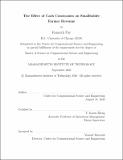The effect of cash constraints on smallholder farmer revenue
Author(s)
Pay, Kenneth(Wen Hong Kenneeth)
Download1227031708-MIT.pdf (688.6Kb)
Other Contributors
Massachusetts Institute of Technology. Center for Computational Science and Engineering.
Advisor
Y. Karen Zheng.
Terms of use
Metadata
Show full item recordAbstract
Many smallholder farmers in developing countries struggle to make ends meet. We develop a model that examines how markets catering to numerous smallholder farmers reach an equilibrium, while incorporating real world challenges that smallholder farmers face, namely a lack of long term planning and cash constraints. Through this, we analyze the effectiveness of two common forms of government intervention, storage and loan provision. We fully characterize market equilibrium conditions under the base scenario of no government intervention, analyzing how price conditions, number of farmers, and severity of cash constraints impact farmer behaviour. We then illustrate how these results change when storage and loans are integrated into the model. The analysis demonstrates that myopic optimization and cash constraints induce farmers to make sub-optimal decisions, resulting in farmers not receiving the full benefit of government interventions. We show that while storage is always useful in situations where farmers have excess quantity, providing overly generous loan terms can negatively impact farmer revenue by disincentivizing farmers from selling their produce on the market. We also show that attempting to improve equality by alleviating farmer cash constraints can result in negative externalities like increased wastage. Empirical analysis with Bengal gram farmers in India shows that farmers are in dire need of government assistance to meet their cash constraints. However, improving loan terms only boosts farmer revenue up to a point, after which revenue declines. The analysis shows that while loan schemes are widely popular and sometimes necessary in aiding struggling farmers, governments should be aware that the strategic response of different farmers can result in adverse effects.
Description
Thesis: S.M., Massachusetts Institute of Technology, Center for Computational Science and Engineering, 2020 Cataloged from student-submitted PDF version of thesis. Includes bibliographical references (pages 77-79).
Date issued
2020Department
Massachusetts Institute of Technology. Center for Computational Science and EngineeringPublisher
Massachusetts Institute of Technology
Keywords
Center for Computational Science and Engineering.